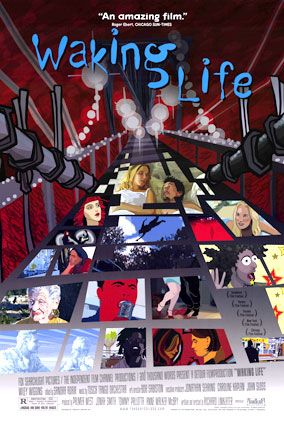“Asking the Wrong Questions”

| None | Light | Moderate | Heavy | |
|---|---|---|---|---|
| Language | ||||
| Violence | ||||
| Sex | ||||
| Nudity |
What You Need To Know:
WAKING LIFE is like nothing you’ve ever seen. The movie is also too often annoying and tiresome. It is aimlessly chock full of many different, sometimes complex, philosophical, spiritual and social commentaries that often contradict themselves and that drone on and on. It also seems to come to a Gnostic, New Age conclusion. WAKING LIFE also includes some strong foul language, excessive violence that young people might imitate and an ignorant anti-gun message
Content:
(PaPaPa, EvEv, HH, PCPC, ACap, Co, B, C, LL, VVV, S, A, D, M) Gnostic New Age pagan worldview that ultimately preaches a kind of universal salvation filled with many different, often conflicting points of view including some strong evolutionary ideas, a debate on free will versus determinism from an existentialist point of view, plus a politically correct sequence unfairly & ignorantly mocks pro-gun advocates, a couple minor characters go into anti-capitalist, Marxist rant, & there is some discussion of God & the New Testament in a non-threatening way; 12 obscenities (including a few “f” words) & 0 profanities; man commits suicide by setting fire to himself & two pro-gun advocates shoot each other to death, with blood; implied fornication; partial upper male nudity as couple lies in bed; alcohol use; smoking; and, one character expresses hedonism.
More Detail:
Director Richard Linklater, who allegedly worked on the script with his acting partners, shot WAKING LIFE as a live-action feature, then used computer animation to apply a wavy, colorful animation over the actors and their surroundings. The movie follows an anonymous young man, played by Wiley Wiggins, as he encounters many different characters expressing their philosophies of life. Most of the characters are people on the street, but there are a couple of real philosophers and professors, and at least one scientist who talks about evolution.
Eventually, the young man discovers that he’s having a series of dreams within a dream, but he’s having trouble waking up from the dream. At some point thereafter, there’s discussion of Roman Catholic movie critic Andre Bazin’s idea that movies have within them “Holy Moments” where moviegoers can figuratively touch the face of God. Later, a discussion ensues with a pinball player (played by the director, Linklater), about the famous science fiction author Phillip K. Dick’s weird musings about the Book of Acts, where Dick thought everyone may really be living in 50 A.D. with St. Paul but they’re dreaming of living in another time. That flows into a discussion about another spiritual theory which says that we keep on living because we keep on saying “No” to God but we die to join Him in Eternity when we finally say, “Yes.” Shortly thereafter, the young man finds himself near a house where a young girl once told him years ago that, “Dream is Destiny.” The young man then starts levitating. He floats way up into the blue sky until he disappears. The End.
This brief description barely tells all the things that Linklater packs into this movie. As noted above, WAKING LIFE is filled with many different, often complex, philosophical, spiritual and social commentaries from a myriad cast of characters. Some of them are quite funny, but it all gets to be a bit much after awhile. Only later, in the ending which I have just described, does the movie begin to broach the subject of God. It is there also that WAKING LIFE begins to seem somewhat cohesive. Regrettably, however, Linklater fails to follow this discussion to a conclusion that makes much sense. One critic, the infamous Roger Ebert, said that’s what he likes about the movie – that it never provides any real answers, only a bunch of questions.
That’s all well and good, perhaps, but only if you ask the right questions!
WAKING LIFE never really asks the right questions. Despite all of its philosophizing, it never asks one of the most fundamental philosophical questions of all: How can we separate truth from falsehood? Or, to put it another way, What is the best test for truth?
Depending on their point of view, philosophers have answered this philosophical question in many different ways. Since, however, most people are highly unlikely to have the time and the talent to investigate all of the possible answers to this question, some philosophers have posited one final answer. They suggest that it is best if one can find some reliable authority whom you can trust to teach you the truth.
This authoritarian test for truth is a very profitable solution for the Christian. For, if a Personal Creator does indeed exist, then what better source than the Word of God to rely upon for one’s knowledge of truth? Furthermore, since Jesus Christ is the only historical figure who claims to have risen from the dead, that makes Him and the New Testament documents the most reliable tests for truth of all!
That still leaves us with the problem of how best to interpret the Holy Scriptures, however. Consequently, many Christian philosophers have proposed that we must have adequate, rational principles of interpretation. Such principles, when used in conjunction with the power of the Holy Spirit, have made reliable biblical exegesis far more manageable than most non-Christians care to admit. As we do with any other author of a text like the Bible, it is always best to assume that the author of the text, in this case God, does not contradict himself, and that the original Hebrew, Greek and Aramaic words written down in the Bible have specific meanings within the context in which they appear. Thus, the Christian can use his rational mind and the laws of logic to make a relatively objective empirical investigation of what each passage in the Bible is teaching, in conjunction with all the other biblical passages.
In this way, therefore, the Christian philosopher can avoid the pitfalls that exist in a flawed movie like WAKING LIFE. He does not have to succumb to obscurity and endless questioning, nor be perplexed by the Gnostic musings of a bunch of two-bit philosophers who know next to nothing about the epistemological foundations of true knowledge. Nor does the Christian philosopher who firmly believes that Jesus Christ is the perfect embodiment of Truth have anything to fear from an honest investigation of truth. As Paul says in 1 Cor. 13:6, “Love does not delight in evil but rejoices with the truth.”
Let us therefore rejoice!



 - Content:
- Content: 

